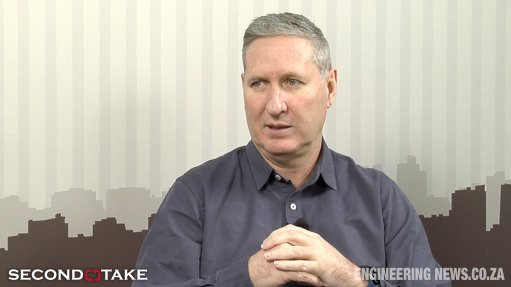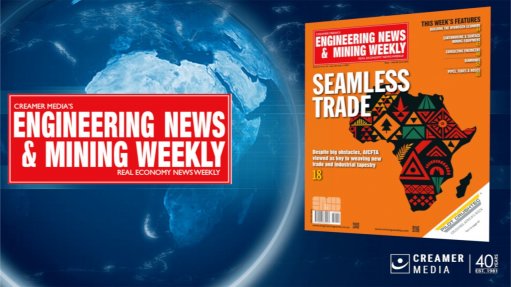Reserve Bank concern about decline of public markets welcome development – Miller



AmaranthCX director Paul Miller interviewed by Mining Weekly's Martin Creamer. Video: Darlene Creamer.
Flashback: Paul Miller's listing of Keaton on the JSE.
Photo by Creamer Media
Flashback: From left Paul Miller, Mark Parker, John Park and Dean Cunningham at Keaton listing.
Photo by Creamer Media
JOHANNESBURG (miningweekly.com) – The concern that South Africa’s Reserve Bank expressed last week on the state of this country’s public markets is seen as a welcome development by AmaranthCX director and public market promoter Paul Miller.
Everything the Johannesburg Stock Exchange (JSE) has done has not been enough to change the downward trajectory.
Last year was the worst year on record for new JSE listings and primary capital raisings, but this is not seen as a problem by National Treasury and the Financial Services Conduct Authority (FSCA).
"The number of public companies or listed companies is declining year after year after year, and yet we get no policy response at all,” Miller pointed out in a Zoom interview with Mining Weekly on what can be done to grow South Africa’s public market investor base and attract more listings to the JSE. (Also watch attached Creamer Media video.)
“Public markets serve a social good. They give us price discovery, they provide pension funds with somewhere to put the money. If we allow everything to go private, we are also allowing everything to go dark. So, we mustn't give up on public markets. They’re too important.
"In every other major financial market, the public market itself is recognised as being a competitive edge for a country. Countries with good public markets recognise that this is how you compete as an economy against other economies, and that you need to constantly improve the competitiveness of your public market. You need to be looking at the structure, form, substance, regulation of that public market all the time," Miller noted.
More than 60% of the gross market capitalisation of the JSE is now made up by secondary listed companies that are served by financial sectors elsewhere in the world.
“Nobody thinks that this is a problem. So, that's the first step we need to get to and that's where the breakthrough has been the fact that the Reserve Bank has finally started publishing some information and announcing in their review of last week that they are doing further research and further work to better understand why our public market has become so shallow.
“To be fair, they tend to concentrate on the debt market rather than the equities market, but they did include the changing structure of our equity markets in their concern. If the JSE can't get it right to get attention on this problem and get any action taken, if National Treasury is entirely passive, if the FSCA says there's no problem here, at least the Reserve Bank might be able to pay some attention, spend some money, do some research and come up with some solutions for this problem.
“I think the JSE has done a lot. I don't think they've been able to engage in a meaningful way with the policy makers,” said Miller.
Mining Weekly: To what extent could a well-supported South African public market system create the inclusive economic growth that South Africa so desperately needs?
Miller: That's the strange thing. To some extent, our public markets in South Africa are way more developed than we are as a country. We've got the fortieth largest economy in the world, but we've got the twentieth largest public market, so it's a superpower. It's something that we do much better, on a relative basis, than a lot of our competing countries, and that's fantastic. But the idea that we can just neglect it, is astonishing. We've got this services economy that's built up around the financial services. It employs lots of people. It's growing ahead of the rest of the economy. At its heart, is the public market, and yet, we’re allowing it to wither. As we've seen, our logistics infrastructure, our power infrastructure, all these things have been allowed to wither. Yet, the public markets more generally, which are fundamentally a private-sector initiative, have not been able to address these issues, and that's disappointing.
When it comes to mining exploration, should a cadastre system that provides efficient administration remove the excuse of National Treasury to refrain from introducing tax incentives like those that stimulate exploration in competing mining jurisdictions?
National Treasury is pretty explicit on this issue. They're saying they're not going to pick industries to benefit from tax incentives and I've got some sympathy for the point of view, the idea that bureaucrats should decide which industry deserves help and which doesn't, because if you are a farmer or someone in the energy sector you say, why can’t we have something? However, there is an existential crisis developing in our mining industry, in that it takes 10 to 20 years from discovery to development of a new mine, and in 10 to 20 years, a lot of our current mines are going to be at the end of their lives. So, we owe it to the future to encourage more exploration today. One of the instruments that can be used is a tax incentive for exploration, but there are lots of others, too. We could invest in our regional geophysical surveys and make that data public. We could simply improve the administration of our prospecting rights beyond just the cadastre. I don't think a cadastre is a silver bullet on its own. I don't think a tax incentive for exploration would be a silver bullet on its own. It's a combination of different factors to encourage exploration. What I would really like is for National Treasury to appreciate that they discriminate against direct investors in the stock exchange, and we are not asking for a tax incentive. We’re asking for equal treatment between institutional investors and direct investors in the stock exchange in order to encourage retail investors to participate directly. That’s not a tax incentive. That’s just introducing fairness into the public markets, which we don’t currently have.
Following last month’s AGM of the JSE, are any new steps being taken within our public market system to stimulate more retail investor activity on the JSE?
I'm afraid I don't see much happening. There is a rewriting of the JSE listings requirements, which is very welcome. This includes a more graduated regulatory regime for different sized companies. Smaller companies will have lesser requirements and as you proceed up the index to the very large companies, they will have the highest level of regulatory requirements, which I think is a very welcome move. But in terms of retail participation, we've not seen any material changes, and I think that's not really the remit of the JSE itself. It's the fact that our policy makers at National Treasury are very passive on this issue, and don't seem to think there's a problem.
Why is the attraction of small and medium-sized companies to the JSE important for the JSE?
There are two things we're talking about here, and perhaps they’re two sides of the same coin. In order to have small and medium companies come to the JSE, they've got to be confident that firstly, they'll get a good rating on their share price, but secondly, they'll be able to raise capital. Then on the other side, in order for smaller companies to raise capital, they need a very much more diverse investor base, which includes retail and other non-institutional investors. Now, you need both, and they're kind of mutually reinforcing. The more activity you have among small and medium companies, the more investors you'll attract, and the more investors you attract, the more medium and smaller companies you'll have. We've not even seen an in-depth analysis or diagnosis or understanding or report or study into this issue from either the JSE or National Treasury, except just last week, we saw the South African Reserve Bank come out with their financial stability report, and for the first time, an official regulator in South Africa has expressed concern on the state of our public markets and how shallow those markets have become. And that's a welcome development, because it's been very frustrating to have National Treasury simply saying there's nothing to see here. There's no problem which is quite different to what's happened in other markets. For example, in the UK, which has also seen a decline in the number of listed companies, a 60% decline in the number of listed companies over the last few decades, they've pulled out all the stops to investigate the issue, implement reform initiatives, try and get into why it is that our public markets are not performing as we would like, and we’re not seeing the same energy in South Africa. It's almost like National Treasury is not interested.
Should the entrepreneurial end of the JSE be represented on the board of the JSE through the appointment of small-end directors?
That’s a good question. We have to step back a bit. The Jacobs Committee report of 1992 set up the scaffolding on which our whole regulatory environment is developed. The way we regulate our savings industry has developed over the last three decades, and there's no question that the big beneficiaries of the structure of our savings industry have not been the savers themselves. It's been our very concentrated, dominant financial institutions. Now, there's a very valid argument, I believe, to say that the indirect or unintended consequence of this concentration of our financial services industry and the high retail investment fees that they charge, has actually caused this issue with the JSE. Yet, if you look at the directors of the JSE, and I'm not casting aspersions on them at all, they are very experienced business people and there's no question that they belong as directors of public companies. But they all come from large financial institutions, those very financial institutions that have participated in extracting rents from our market and, in effect, driving out retail investors from direct participation in the JSE. So, we have directors of the JSE who all come from those highly concentrated major financial institutions. How can they possibly know what it means to raise money for a junior explorer? How can they possibly know what it means to try and run a stockbroking firm in a declining market? They've got fantastic experience running major financial institutions, or working in major financial institutions. They've got no experience of what it means to either run or serve a company in the lower end of the stock exchange. It's not to say that they're not great directors, and they need to be there, but the JSE also needs to look at who else needs to be on that board, and that should certainly include someone who's got experience at that lower end, not necessarily as an entrepreneur, but perhaps as a consultant, or a service provider, or someone who's actually tried to raise money in the primary market. I don't see any of that experience in the current board, as worthy as they all are.
Is the absence of directors with small-end and medium-end experience one of the reasons why small and medium-sized companies are not being attracted to JSE in significant numbers?
You can't arrive at that sort of causal distinction. The fact is that the JSE’s own employees tend to also come from big business. In fact, it goes beyond that. The JSE’s advisory committees are largely staffed by people who come out of big business. The JSE’s employees, when they do come from outside the JSE, tend to come from the large companies in the financial services industry and the JSE’s board members all come from the large financial services industry. So, it's not surprising that the JSE itself has battled to attract smaller companies to the board. It's not to say that any of those people, in and of themselves, aren’t worthy of their roles. It's just to say there's no diversity. If you think that the policy makers, the regulators, the consultants, everyone who makes their living in financial services in South Africa, tends to serve the large end of the market, and we see that replicated again and again, and really, it's not surprising that the JSE is very similar. We just don't have fintech entrepreneurs or founders, or the kinds of people who perhaps would be bit more disruptive, involved in these organisations.
Can you name reforms that the JSE has introduced in recent years that have been successful in increasing activities on the exchange?
I've been around for quite a long time and the JSE has done an enormous amount to try and address these issues. Each individual initiative has been somewhat successful. But they still haven't been able to change the trajectory. What's fair to say is it's actually beyond their remit. It's the policy makers that need to pay attention to this problem. The evidence is in. Everything the JSE has done, even when it has been successful, has not been enough to change the trajectory. The introduction of the AltX was successful. The introduction of real estate investment trusts was successful. We've got special purpose acquisition companies, some of them have been listed, perhaps a bit less successful. The JSE has lobbied hard for inward dual listings and 65% of the gross market capitalisation of the JSE is now inward dual listings. We've got companies that actually have no operations in South Africa or negligible operations in South Africa, that are listed here. We've had these pockets of success, and we've had two and a half, I call them listings booms, in the last 30 years. But none of that's been sufficient in itself to reverse the trajectory. It's not like other markets aren't battling with the same problems. That's true. But at least in other markets, action has been taken. In South Africa, it's all left to the JSE, and yet they don't have the levers to make a difference. We really need to understand why it is that we have such low levels of retail participation in our market. It's not the only thing we need, but that's one primary requirement for a successful market, a much more diverse investor base participating directly in the market.
What is your view on the introduction of the JSE’s private placement market?
I think we need to be a little bit more circumspect about how successful the private placement market has been because I've not been able to establish, from what the JSE has said publicly, exactly how many companies have raised money on that private market. They talk about having mobilised capital and having attracted people looking to raise money. I don't know, and it's not easy to tell, how many actual issues of shares for cash there have been in that market. The JSE knows that it has to diversify its revenue sources and it's important to understand that private markets are important. I don't think we must give up on public markets and decide that we must just throw our lot in with private markets. Public markets serve a social good. They allow us to price equities. They give us price discovery, they provide pension funds with somewhere to put the money. Nobody has more disclosure than public companies. If we allow everything to go private, we're also allowing everything to go dark. So, we mustn't give up on public markets. They’re too important.
In the event of a listings boom, are there sufficient investor relations, investment banking services and advisory skills to cope with a major upsurge in the number of listings on to the JSE?
That’d be a quality problem to have, wouldn't it, if we could. There are lots of generalist corporate financiers out there, and they would have to get into the rule books and swot up on how to do it again. But the fact is that to sustain a career in equity capital markets in South Africa, you have to be a generalist in many respects. Those people are out there, and they could change their focus, and get involved in new listings and capital raisings, which would be great. We don't want to overstate the problem. There are lots of financial services professionals out there, and they would train up quickly. But if there was a massive boom in listings, there would initially be a shortage of skills, but I think we could manage.
Comments
Press Office
Announcements
What's On
Subscribe to improve your user experience...
Option 1 (equivalent of R125 a month):
Receive a weekly copy of Creamer Media's Engineering News & Mining Weekly magazine
(print copy for those in South Africa and e-magazine for those outside of South Africa)
Receive daily email newsletters
Access to full search results
Access archive of magazine back copies
Access to Projects in Progress
Access to ONE Research Report of your choice in PDF format
Option 2 (equivalent of R375 a month):
All benefits from Option 1
PLUS
Access to Creamer Media's Research Channel Africa for ALL Research Reports, in PDF format, on various industrial and mining sectors
including Electricity; Water; Energy Transition; Hydrogen; Roads, Rail and Ports; Coal; Gold; Platinum; Battery Metals; etc.
Already a subscriber?
Forgotten your password?
Receive weekly copy of Creamer Media's Engineering News & Mining Weekly magazine (print copy for those in South Africa and e-magazine for those outside of South Africa)
➕
Recieve daily email newsletters
➕
Access to full search results
➕
Access archive of magazine back copies
➕
Access to Projects in Progress
➕
Access to ONE Research Report of your choice in PDF format
RESEARCH CHANNEL AFRICA
R4500 (equivalent of R375 a month)
SUBSCRIBEAll benefits from Option 1
➕
Access to Creamer Media's Research Channel Africa for ALL Research Reports on various industrial and mining sectors, in PDF format, including on:
Electricity
➕
Water
➕
Energy Transition
➕
Hydrogen
➕
Roads, Rail and Ports
➕
Coal
➕
Gold
➕
Platinum
➕
Battery Metals
➕
etc.
Receive all benefits from Option 1 or Option 2 delivered to numerous people at your company
➕
Multiple User names and Passwords for simultaneous log-ins
➕
Intranet integration access to all in your organisation





















